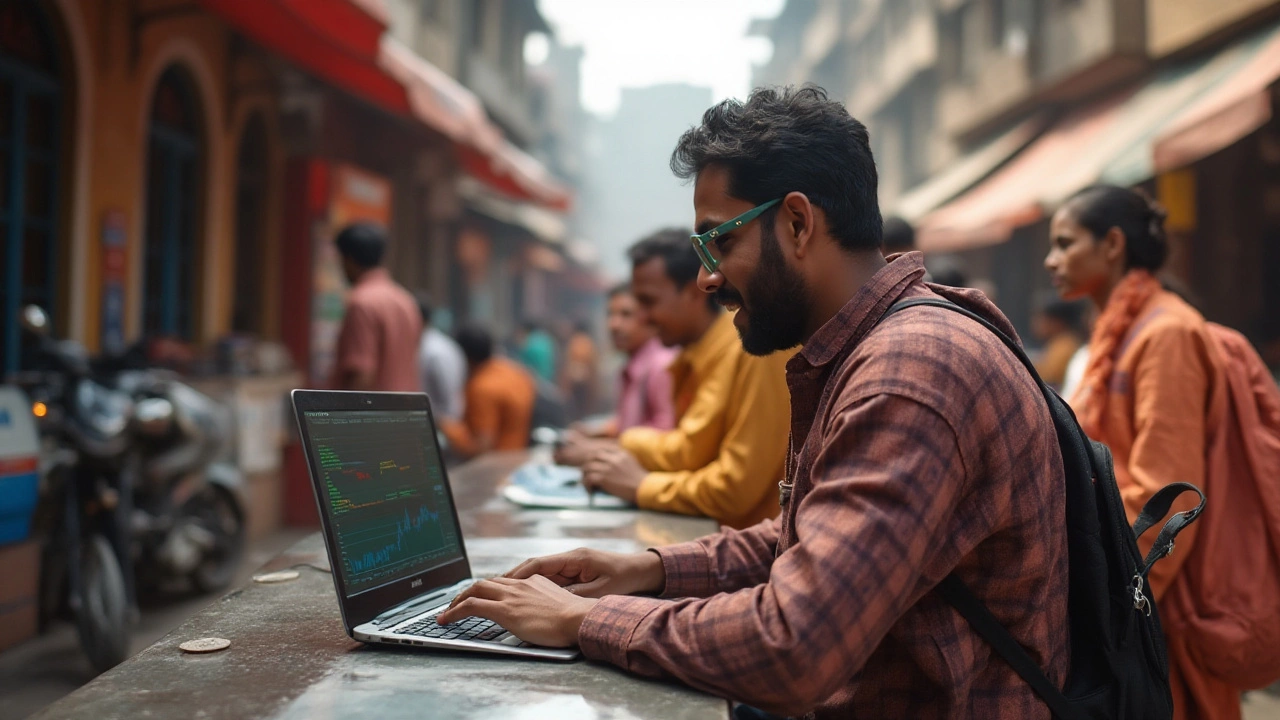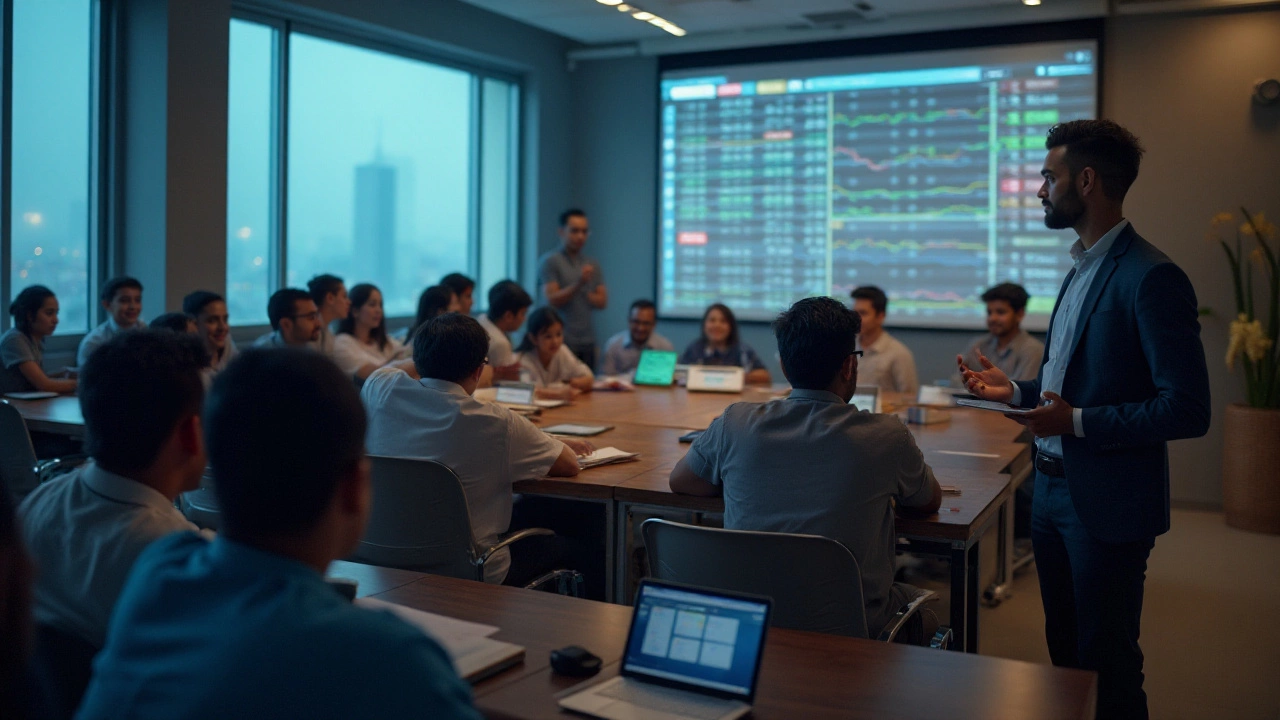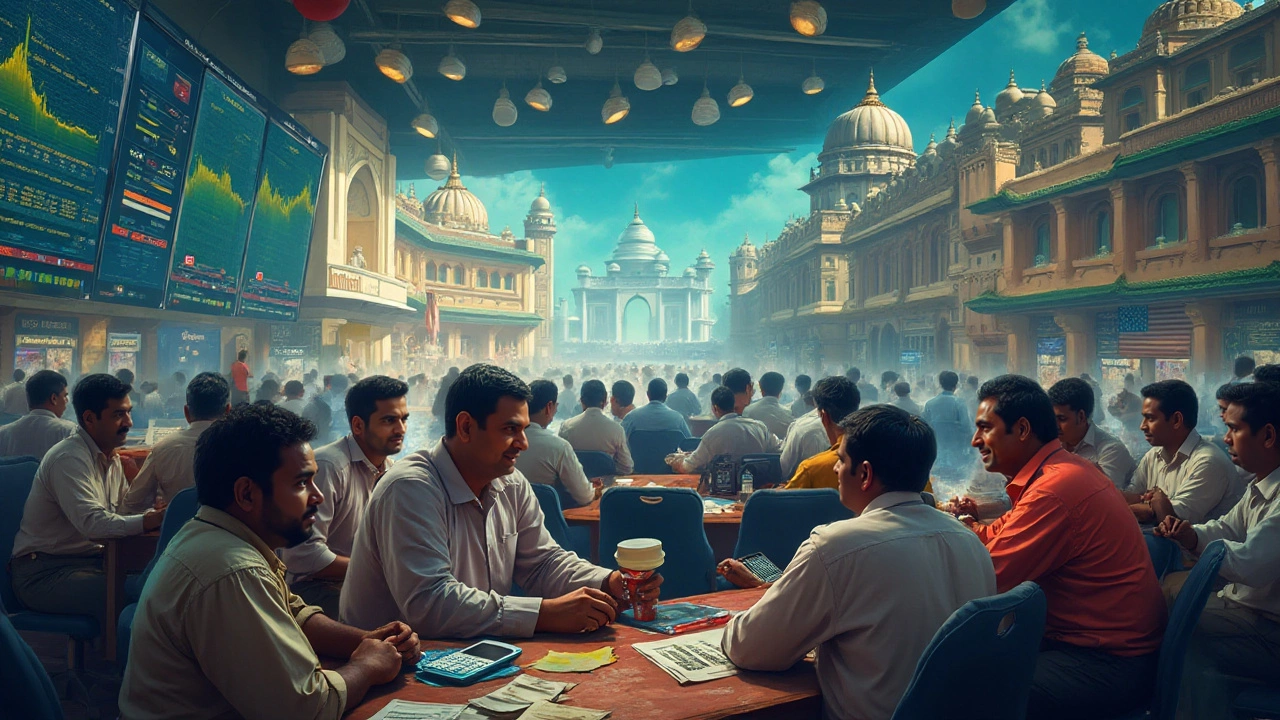India, a nation that has seen phenomenal economic transformation, is becoming a key player in the global trading arena. With its gigantic population and a burgeoning middle class, the potential for traders is enormous. Whether you're a new trader looking to learn the ropes or an experienced investor seeking fresh opportunities, India holds promise.
With favorable trade regulations and a diverse economy, India presents a unique landscape for trading. It is essential, however, to understand both the glittering prospects and the pitfalls that one might encounter. From equities and commodities to digital assets, the options are varied and require a strategic approach.
Moreover, investing in skills is indispensable. There is an array of trading courses available in India designed to equip traders with the necessary knowledge and tools to succeed in this competitive environment. These not only cover foundational concepts but also bring in global insights which are crucial for broadening one’s horizons.
- India's Economic Landscape
- Opportunities in the Indian Market
- Challenges Faced by Traders
- Trading Courses and Learning Resources
- Future Prospects for Trading in India
India's Economic Landscape
India's economic landscape is remarkable for its diversity and dynamism, distinguishing it as a unique giant in the global market. As the world's fifth-largest economy, India's GDP is a testament to its growth trajectory, fueled by a mixture of industries such as technology, agriculture, manufacturing, and services. A staggering statistic is the IT sector's contribution which has propelled India onto the world stage as the back office of the globe, generating significant revenue and employment opportunities.
One cannot overlook the demographic dividend that India boasts—over 65% of its population is under the age of 35, making it one of the youngest populations globally. This youthful demographic is a substantial economic driver, contributing to a vibrant consumer segment that continually boosts domestic demand. As a result, sectors like e-commerce, telecommunications, and retail are flourishing, presenting abundant opportunities for entrepreneurial ventures and investors alike.
The Indian government has also been pivotal in shaping this economic landscape with several reforms and initiatives. Investments in infrastructure, 'Make in India' campaigns to boost manufacturing, and 'Digital India' to enhance technology infrastructure drive economic momentum. Indian market presents an investment-friendly atmosphere with policies set to attract foreign direct investments in various sectors. "India has the potential to be the fastest-growing economy over the coming decades as it continues to liberalize trade and adopt new technologies," noted the International Monetary Fund in a recent report.
The geopolitical landscape also plays a crucial role in India's economic setup. Strategic alliances and participation in global trade agreements have opened various avenues for export and import opportunities. The formation of economic corridors with neighboring countries is indicative of India's intent to foster regional and global trade relations. India trading is not just about leveraging domestic markets but also involves integrating into the global economy.
Citing a report by the World Bank, it is mentioned that, "India's efficient resource utilization and its strategic focus on sustainable and inclusive growth remain exemplary, offering valuable insights for emerging markets."
Key Sectors Fueling Growth
Critical sectors contributing to India's growth story include Information Technology, which stands as a backbone due to its prowess in software services and technological innovation. Agriculture doesn't lag, with innovative practices and the Green Revolution playing a crucial role in ensuring food security for such a populous nation. On the other hand, the manufacturing sector is set to see a surge as policies geared towards enhancing production capabilities come into play.
Additionally, the financial sector is undergoing rapid transformation, with fintech companies creating waves through digital payment solutions and improved accessibility to financial services. Modern India's ability to adapt to technological changes aids in sustaining high growth and maintaining economic resilience even amid global economic turbulences, making the country an exciting realm for investments and trade courses focused on equipping budding traders.
Opportunities in the Indian Market
India, the world's second most populous country, presents a wealth of trading opportunities ripe for exploration. The nation's economy is one of the fastest-growing globally, a fact that propels it into the spotlight for investors and traders alike. Rapid urbanization and technological advancements have fostered an environment that is conducive to diverse trading ventures. From traditional sectors like agriculture and textiles to modern domains such as technology and renewable energy, the spectrum available for trade is expansive and enticing. This diversity ensures that traders can find niches that align with their expertise and interests, paving the way for lucrative undertakings.
The Indian government has also been proactive in opening up the market, making trade more accessible. Initiatives like 'Make in India' aim to encourage domestic production, while 'Digital India' seeks to integrate technology into various sectors. These programs not only bolster economic growth but also create channels for new and innovative investment opportunities. With more open trade policies and a focus on international partnerships, India is positioning itself as an attractive destination for global trade. A report by NASSCOM highlighted that India's IT sector alone is expected to reach a $350 billion valuation by 2025, reflecting the immense potential within technical industries.
To dive into specifics, the stock market in India is also burgeoning with potential. The National Stock Exchange (NSE) and Bombay Stock Exchange (BSE) are among the largest exchanges worldwide, both experiencing robust activity and liquidity. There is a growing trend among the Indian populace towards financial literacy and investment, heralding a new era of active participation in stock trading. Moreover, the regulatory environment provided by the Securities and Exchange Board of India (SEBI) is strengthening to offer better safeguards, ensuring that the interests of investors are protected.
"India is not simply a story of a growing market but a confluence of traditions and technologies that create unparalleled opportunities," remarked International Monetary Fund Managing Director Kristalina Georgieva in a recent address.
Sectoral growth is also impressive. Renewable energy is set to expand significantly, given India's commitment to cutting carbon emissions and transitioning towards sustainable practices. The push towards solar and wind energy is creating a burgeoning market for related trades. Similarly, the pharmaceutical sector, already a powerhouse, is expanding further with constant research and development efforts, looking to capture a larger share of global markets.
Key Sectors to Watch
- Technology and Innovation: Companies in software development, IT services, and fintech are thriving and present strong growth potential.
- Healthcare and Pharmaceuticals: With rising global recognition, Indian pharmaceutical companies are promising sectors for traders.
- Renewable Energy: Government policies supporting clean energy transitions open vast avenues for trade in solar and wind technologies.
- Agriculture: Despite urbanization, agriculture remains a vital sector, crucial for trading both domestically and internationally.
- Consumer Goods: With an expanding middle class, consumer goods, especially within the e-commerce framework, are booming.
For those considering tapping into this vibrant market, understanding these dynamics is crucial. With its mix of tradition and modernity, India's market promises both stability and growth, an enticing combination for any ambitious trader.

Challenges Faced by Traders
Trading in the Indian market, like any other, comes with its own set of challenges that require resilience, strategy, and understanding to navigate successfully. One of the primary hurdles is the market volatility, which can be a double-edged sword offering both high risk and reward. The volatility is fueled by multiple factors, ranging from global economic dynamics to domestic policy changes. Traders must continuously stay informed and adapt quickly to these shifts to minimize risks associated with their trades. This volatile nature demands a keen sense of timing and nerves of steel, as prices can fluctuate rapidly, throwing any unprepared trader into confusion.
Another challenge is the regulatory framework in India, which, although largely supportive, can sometimes appear cumbersome. Navigating bureaucratic processes and ensuring compliance with regulations demands dedication and a thorough understanding of trading laws and guidelines. While government policies have made remarkable progress towards easing trading operations, modifications can be frequent and sometimes unpredictable. Therefore, traders need to keep abreast of the latest updates to avoid falling foul of regulations, which can result in fines or trading bans. This ever-evolving regulatory landscape requires active engagement and may necessitate consultation with legal experts.
The Indian market is also vast and diverse, presenting a challenge in terms of information overload. The sheer volume of data available can be overwhelming, especially for a new trader. Filtering important information from noise is key to making informed trading decisions. Mastery over data analytics tools can provide an edge, but the skillset needs time and experience to build. The learning curve is steep, and the competition is fierce, with numerous players entering the trading scene in India. Traders must continuously refine their strategies and remain competitive in this dynamic environment.
Technical challenges such as the digital infrastructure can also pose significant hurdles. While India has made great strides in digital connectivity, inconsistencies in internet speed or coverage can result in delays during crucial trading hours. Access to reliable trading platforms and tools can greatly impact the efficiency and effectiveness of trading operations. Traders may need to invest in quality technology and software to ensure their trading systems are robust, efficient, and capable of handling high-volume transactions without hiccups.
"The successful trader is not one who never fails, but one who can accept all the negatives and learn from them," says psychology expert Dr. Van K. Tharp.
Cultural differences and domestic market behavior can catch international traders off guard. Understanding the local consumer and market behavior is crucial. Often, what works globally may not resonate with the Indian market, which can exhibit unique trends and demand patterns. Thus, thorough research and market analysis tailored to local dynamics are indispensable. Traders need to attune themselves to the nuances of the Indian market to form effective strategies.
Trading Courses and Learning Resources
In recent years, trade courses in India have seen a significant upsurge in both number and quality, catering to the growing demand for knowledge in the complex field of trading. As the Indian market expands its horizons, understanding trading dynamics becomes not just beneficial but essential. For those ready to dive into the world of trading, India offers a range of courses, from online certifications to comprehensive classroom programs, each with its unique teaching style catered to different levels of expertise—be it novice or seasoned investors.
These courses often cover foundational principles of trading, including technical analysis, chart patterns, derivatives, portfolio management, and understanding financial markets globally, with a specific focus on India trading. Institutes like the National Institute of Securities Markets (NISM) offer robust programs crafted by financial experts. Such courses are equipping students with practical tools and theoretical insights, helping them navigate markets effectively.
Resources and Institutions
The diversity of resources available is immense. Online platforms such as Zerodha Varsity and Upstox offer comprehensive e-learning modules that are accessible from anywhere. They often provide free materials with optional paid certifications to validate skills. Many of these courses emphasize market ethics—a crucial component in building long-lasting careers in trading. For those who prefer a classroom setting, premier institutes like the Indian Institute of Capital Markets provide diploma courses in securities markets.Additionally, leveraging peer reviews and participating in community forums or trading desks can offer unexpected learning pathways. Connecting with fellow traders through platforms like TradingView can provide real-time insights and strategies that are not available in textbooks. These interactions not only expand your understanding but also help build networks that are crucial in a trader’s life. As one seasoned trader aptly puts it,
“In the realm of trading, learning from others' successes and failures is invaluable.”
Learning Through Practical Exposure
Practical exposure through simulated trading and virtual portfolios is another avenue students and enthusiasts are exploring. Such simulations mirror real trading environments, allowing for practice without financial risk. Various programs integrate these simulations into their curriculum, enhancing the learning experience by allowing students to test strategies in controlled settings. They serve as a prelude to live trading, boosting confidence, and proficiency among participants.Keeping Pace with Trends
Following recent trends, courses frequently update their content to include emerging markets and digital currencies, recognizing the shift towards technology-driven trading solutions. Blockchain, DeFi, and fintech innovations are now staple topics in many syllabi, reflecting the changing face of trading worldwide. Understanding these new-age markets equips traders with the versatility needed to thrive.In sum, for those ready to embark on their trading journey in India, the wealth of resources and courses available is both encouraging and exciting. Whether you're aiming to become a full-time trader or enhance your investment strategies, pursuing targeted learning can create a solid foundation—and potentially unlock innumerable opportunities in the bustling world of Indian markets.

Future Prospects for Trading in India
Trading in India is set to enter an exciting phase, driven by a combination of favorable economic factors and evolving regulatory environments. The country's trading prospects hinge significantly on its economic policies that aim to modernize and bolster the financial sector. As the nation advances toward becoming a $5 trillion economy, the stock market, commodities, and digital assets like cryptocurrencies will likely play vital roles in driving economic growth. The Reserve Bank of India's proactive approach, including its recent focus on digital currency initiatives, reflects the multifaceted opportunities the Indian market offers to traders and investors alike.
Infrastructure development has been a cornerstone of India's growth story, with ambitious projects enhancing connectivity across the country. This includes the establishment of new business and financial hubs, creating ripe opportunities for investment and trade activities in various sectors. Such advancements have reduced barriers to entry and increased accessibility for both domestic and foreign investors. By capitalizing on these developments, traders can leverage the expanding consumer base and diverse economic sectors ranging from information technology to manufacturing and services.
India's integration into the global economy is increasing with trade agreements that serve to enhance economic cooperation. For instance, the country's participation in comprehensive agreements like the Regional Comprehensive Economic Partnership (RCEP) opens the door to markets across Asia. Such strategic alliances not only foster international trade but also encourage the exchange of ideas and expertise, leading to sophisticated trading strategies and innovations. "India's role in international trade is set to expand significantly, as we continue to harness the potential of our young, dynamic workforce and robust economic infrastructure," noted a report by The Economic Times.
Innovation in trading platforms and fintech services is providing a new dimension to the trade courses and practices. With growing internet penetration and mobile usage, more people have access to trading platforms, which are becoming user-friendly and sophisticated. These platforms offer real-time analysis, automated trading solutions, and educational resources, making trading accessible to a wider audience. The government's push for a digital economy, including initiatives like Digital India, further simplifies trading and attracts younger demographics to participate in the market actively.
The road ahead for trading in India appears promising, punctuated with advancements that cater to both seasoned investors and beginners. However, navigating this landscape also demands cognizance of certain challenges, including market volatility and regulatory complexities. As aspiring traders explore India trading opportunities, equipping themselves with updated knowledge through targeted trade courses and continuous learning becomes imperative. By understanding the nuances of the Indian trading environment, investors can effectively position themselves to reap potential rewards in this burgeoning market.


